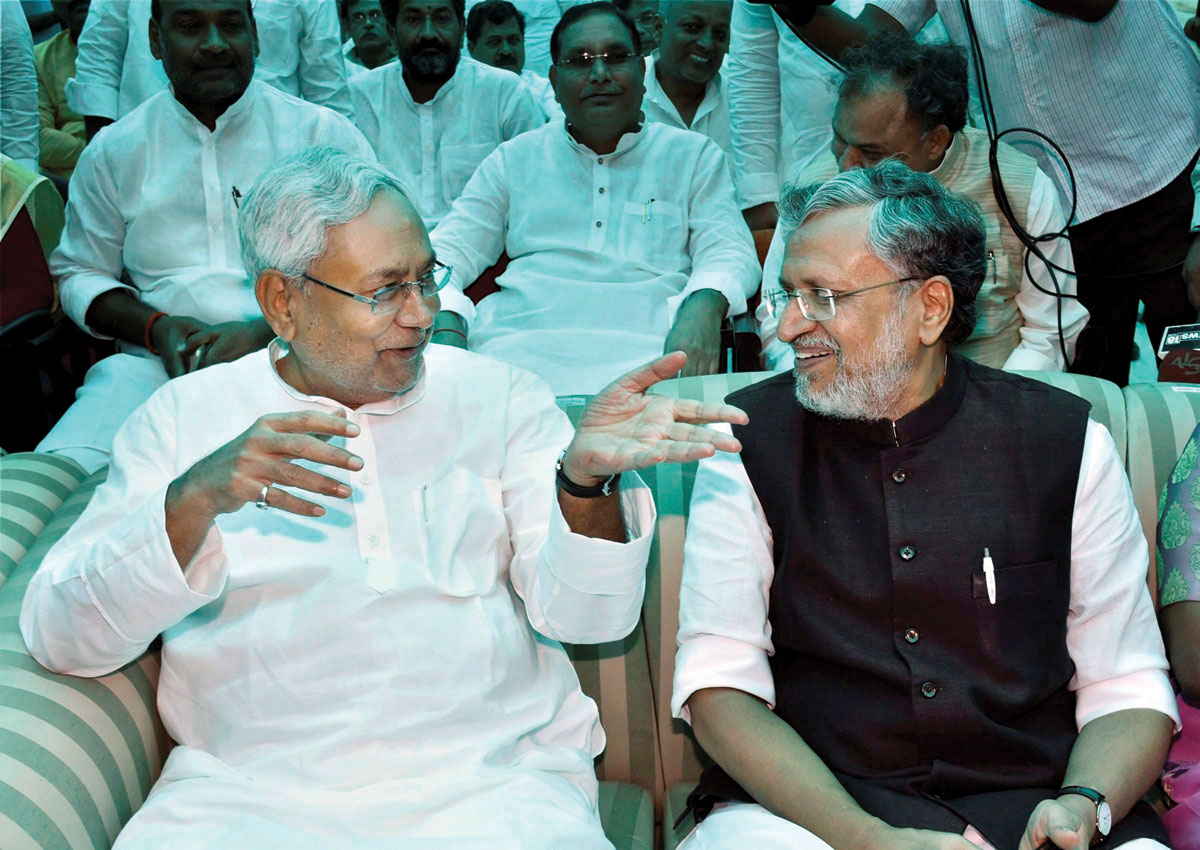The Bihari Chanakya: Nitish Stumps His Friends and Foes Alike
Nitish Kumar with senior BJP leader Sushil Kumar Modi at an oath taking ceremony, at Raj Bhawan in Patna, July 27. Kumar, who had resigned, July 26, after falling out with RJD over alleged corruption charges against Lalu Yadav’s son Tejashwi Yadav, was sworn-in as the Chief Minister of Bihar for the sixth time. Sushil Kumar Modi will be his Deputy Chief Minister. (Press Trust of India)
JD(U) leader Nitish Kumar has become the Chief Minister of Bihar for the sixth time as he jilted an uncomfortable ally in the RJD and joined hands with the BJP after four years, yet again demonstrating his political maneuverability.
Often referred to as the ‘Chanakya’ of Bihar politics, Kumar, 66, quit as the CM of the politically crucial state, July 26, and readily accepted BJP’s support to continue in power, a move that could have a bearing on the 2019 Lok Sabha polls as it is seen as a major setback for efforts to forge opposition unity to stop the BJP juggernaut.
Kumar led the ‘Mahagathbandhan’ (Grand Alliance) that comprised his JD(U), the RJD and the Congress to a stunning victory few thought possible after being bruised and bloodied in the 2014 Lok Sabha polls. Kumar, who first became the chief minister on November 24, 2005, was sworn in for a fifth term on November 20, 2015.
But the uneasy alliance lasted for barely two years with corruption allegation against the kin of RJD chief Lalu Prasad proving to be the last straw. The going was never easy for Kumar as the RJD lost no opportunity to press that it was the major partner in the alliance.
For the cool, suave and workaholic Nitish, he knew his association with 69-year-old Prasad, whom he called his ‘Bade Bhai,’ would be the main point the BJP-led opposition could always score off, but he countered it with an answer to anything and everything thrown at him.
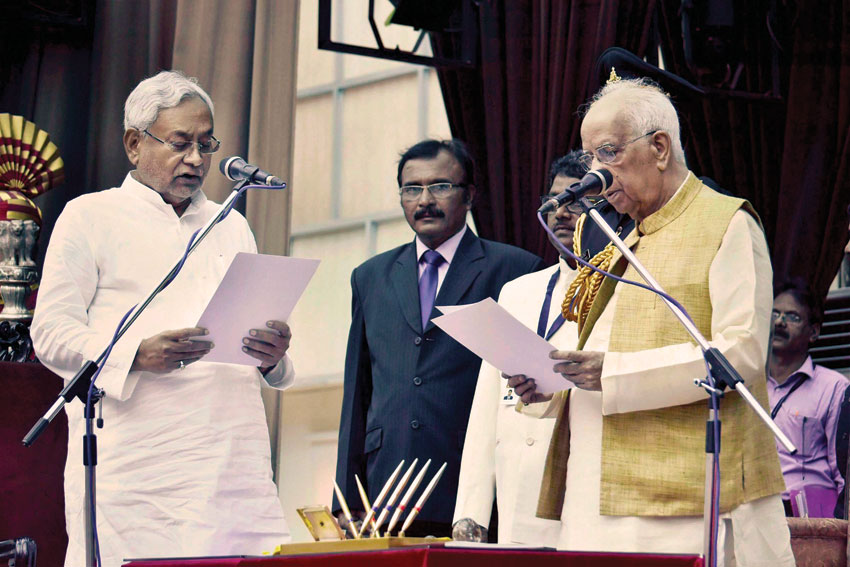
Soft-spoken, sharp and articulate, Nitish, who speaks in a measured tone, had an answer ready with a subtle fact that he himself “had been with the BJP but never been colored, and in any case Lalu is and remains a socialist.”
Persuasive, sometimes adamant, Nitish is known to carry strong likes and dislikes and never forgets a slight—a trait for which Lalu described him as having ‘aant mein daant’ (teeth in his belly).
Working with his new tactician Prashant Kishor, a key strategist for the BJP in the 2014 Lok Sabha polls, Kumar worked a carefully crafted soft campaign template for Bihar in the 2015 Assembly elections.
He invoked only his work, the potential of the next government with him, the slights to Bihar and his own self, strident appeals to Bihar’s ‘Asmita’ (pride) and speaking for himself as the lone Bihari against the ‘Bahari’ (outsider), a veiled reference to Prime Minister Narendra Modi.
Even Sushil Kumar Modi, the tallest BJP leader from Bihar and once his deputy and friend, acknowledges Nitish to be a visionary who changed Bihar.
His breakaway from the BJP in June 2013 stunned the nation, as did his resignation from the chief minister’s post after the JD(U)’s massive Lok Sabha defeat in May 2014 and elevation of his protegee Jitan Ram Manjhi as chief minister and then pulling the latter down to assume power again in February 2015 for a fourth term.
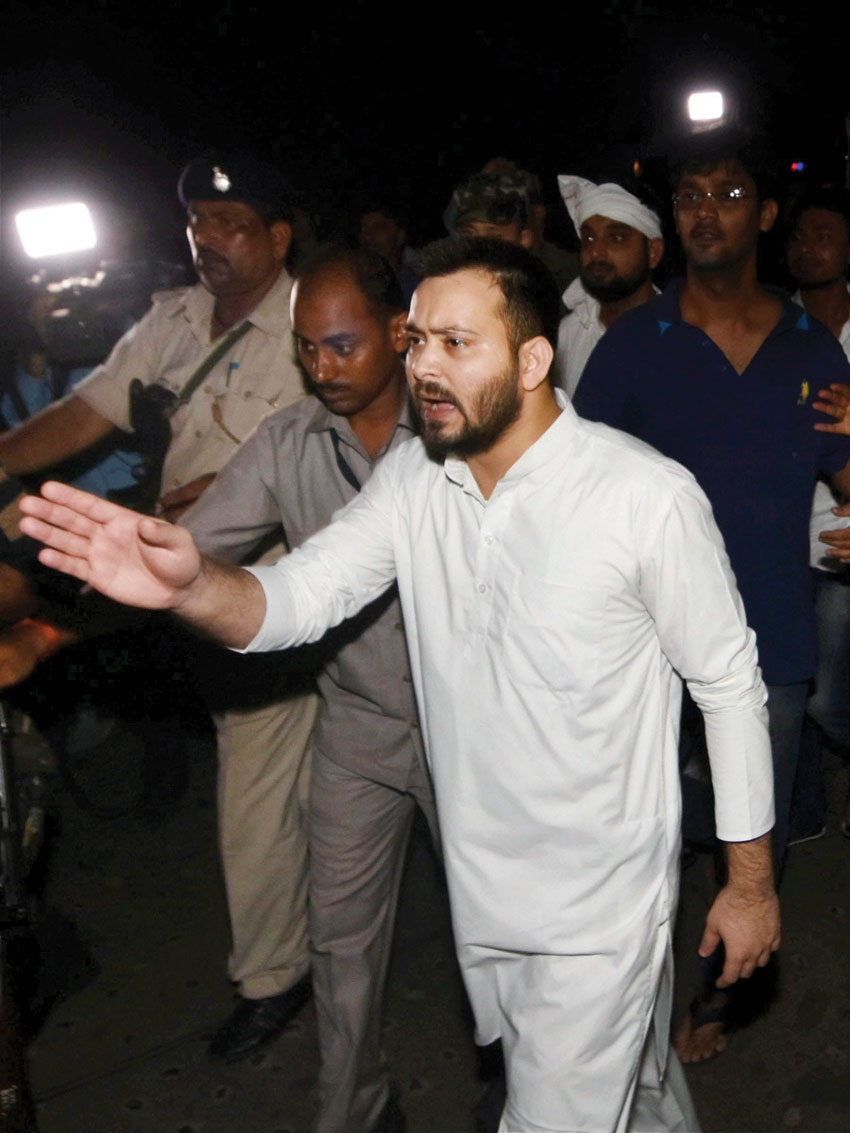
Kumar is also widely known as the ‘Sushashan Babu’ (Good governance man) and ‘Vikas Purush,’ whom even critics credit with turning Bihar around.
Following the age-old proverb enemy’s enemy is friend, the JD(U) leader whose party won just two of the state’s 40 seats in the Lok Sabha poll, joined hands with Lalu to halt bete noire Narendra Modi’s juggernaut in Bihar in the 2015 Assembly polls.
Lalu and Nitish, friend-turned-foe in state politics, sank their differences to revive an alliance that began over 40 years ago with the students’ agitation, which soon turned into a pan-India movement led by veteran socialist leader Jayaprakash Narayan.
Though Lalu got lucky in his very first outing in the electoral arena, winning Lok Sabha poll in 1977, it took Nitish, an electrical engineer from NIT Patna, then known as Bihar College of Engineering, eight more years to get elected to the state Assembly for the first time in 1985, after having lost twice.
Though as different as chalk and cheese, Nitish backed Lalu in bagging the chair of the Leader of Opposition in the assembly in 1989 and again when he challenged Ram Sundar Das and Raghunath Jha, nominees of Prime Minister V.P. Singh and Chandra Shekhar respectively, for the chief minister’s post after Janata Dal came to power in Bihar in 1990.
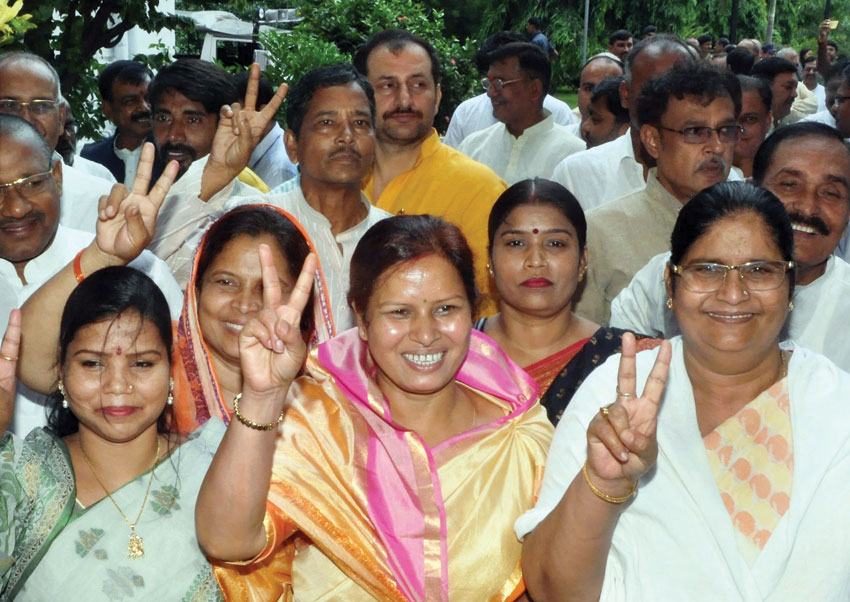
Nitish, who won the 1989 Lok Sabha polls from Barh, shifted his focus to Delhi, getting elected to the lower house in 1991, 1996, 1998 and 1999. He became Minister of State for Agriculture in the Atal Bihari Vajpayee government and then briefly the Railway Minister in 1999. He resigned after the train tragedy at Gaisal in West Bengal in 1999 in which nearly 300 people were killed.
Nitish again became Railway Minister in 2001 and continued till 2004 during which he was credited with introducing several reforms in the public sector behemoth like Internet ticket booking and Tatkal system of instant booking.
The Godhra train burning incident in February 2002, which provided the spark that led to communal riots in Gujarat, occurred during his tenure at Rail Bhavan.
The JD(U) stalwart reworked his social engineering strategy and made a rainbow coalition of OBCs, EBCs, Mahadalits and minorities that helped him sweep Bihar in November 2005 elections, thereby uprooting 15 years of uninterrupted Lalu-Rabri rule.
Bihar became a completely ‘dry state’ last year banning sale and consumption of all kinds of liquor in a move seen as fulfillment of a poll promise to women by Nitish.
Nitish’s passionate pitch for prohibition citing the adverse effects of domestic violence and broken families besides economic and health costs had earned overwhelming support from women for the ruling JD(U) in the 2015 Assembly polls. He reiterated his commitment while announcing the ban.
Nitish’s backing to BJP presidential candidate and former Bihar Governor R.N. Kovind by breaking ranks with the opposition and his support of the Modi government’s demonetization drive had triggered speculation that he was warming up to the saffron party.
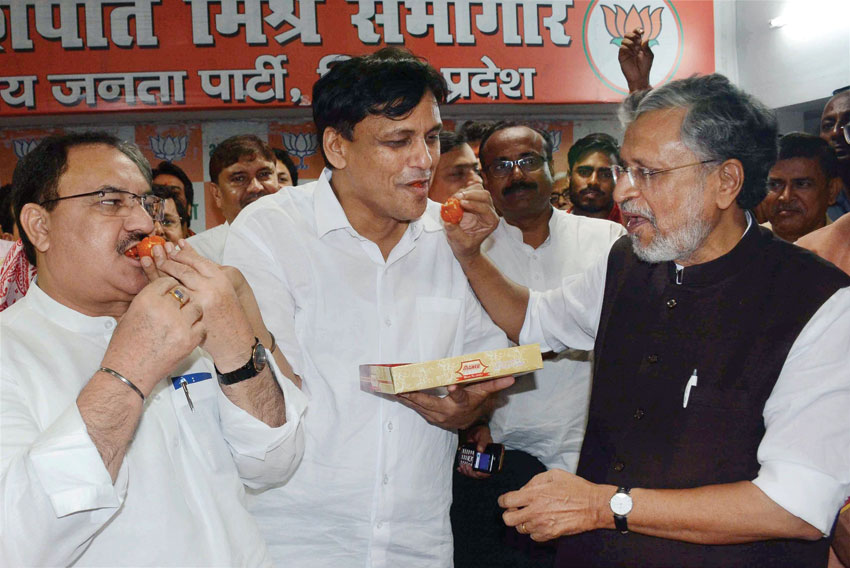
Decision taken in interest of Bihar: Nitish. The decision to part ways with the RJD and join hands with the BJP was taken in the interest of Bihar and will ensure development and justice for the state, Nitish Kumar said, July 27, after being sworn in as the chief minister.
Nitish resigned the post last night after a fall out with the alliance partner RJD over corruption charges against Lalu Yadav and some of his family members, including son Tejashwi, who was the then deputy Chief Minister.
“Whatever decision we have taken will be in the interest of Bihar and of its people. It will ensure development and justice. It will also ensure progress. This is a collective decision. I ensure that our commitment is towards the people of Bihar,” Nitish Kumar told reporters.
Nitish was sworn in as the chief minister of the state alongside senior BJP leader Sushil Kumar Modi, who will be his deputy in the new government, at the Raj Bhawan in Patna.
CPI(M) general secretary Sitaram Yechury attacked Nitish Kumar, July 27, for taking oath as Bihar Chief Minister “every few years” and added the latter has set “quite a record” in this connection.
Yechury also described as “straightforward political opportunism” Kumar’s decision to desert the JD(U)-RJD-Congress grand alliance yesterday over an ostensible reason of corruption charges against his ex-deputy and RJD chief Lalu Prasad’s son Tejashwi Yadav.
“Every few years Shri Nitish Kumar takes oath as CM from a different alliance. It is quite a record. Straightforward political opportunism,” the Marxist leader tweeted.
Samajwadi Party supremo Akhilesh Yadav struck a musical note to mock JD(U) president Nitish Kumar, July 27, for again allying with the BJP to become chief minister.
“Na na karte pyar tumhi se kar baithe, karna tha inkar magar ikrar tumhi se kar baithe. Bihar today,” Akhilesh said in a tweet.
The song is from the 1965 Bollywood film “Jab Jab Phool Khile.”
The Enforcement Directorate, meanwhile, registered money laundering case against Lalu Prasad and his family members in a railway hotel allotment corruption case of UPA tenure, according to an official.
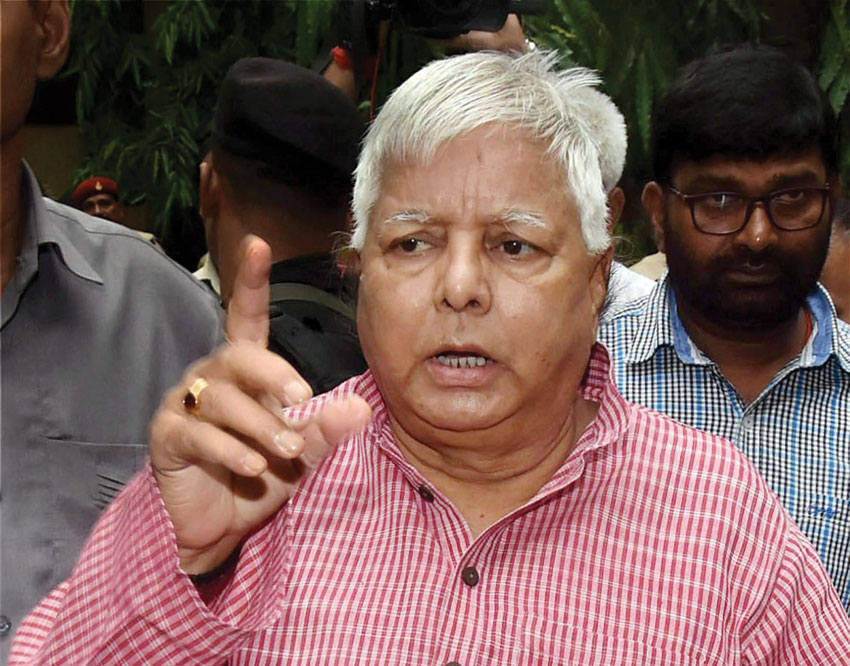
HC Adjourns, till Monday, Petitions Challenging New Nitish Gov’t. The Patna High Court, July 28, adjourned till July 30, the hearing on two PILs challenging the formation of the new government by Nitish Kumar’s JD (U) along with the BJP.
After a brief hearing, a division bench comprising Chief Justice Rajendra Menon and Justice A.K. Upadhyay adjourned the matter.
Two PILs were filed and their lawyers made a mention of them before the bench ahead of the crucial trust vote the Nitish Kumar government has to take in the Bihar Assembly.
One PIL has been filed by RJD MLAs Saroj Yadav and Chandan Verma while the second one by Jitendra Kumar who is a member of the Samajwadi Party.
The petitions sought the court’s order for issuance of a direction to invite the leader of the single largest party to form government in the state.
Principal Additional Advocate General Lalit Kishore and Additional Solicitor General S.D. Sanjay termed the PILs as “frivolous.”
Kishore told the court that while copy of the petitions had been given to the counsel of the Union government, the same was not served to those of other parties including the Governor, the Election Commission of India and the Government of Bihar.
After a brief hearing, the court posted the matter for further hearing on July 30.
Kumar is seeking a trust vote during a one-day special session of the Bihar assembly after the governor asked him to prove his majority on the floor of the House on July 28.
